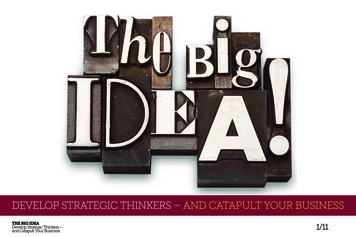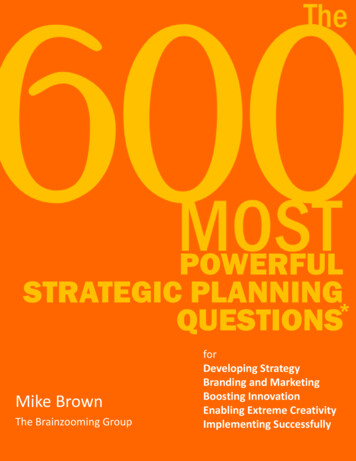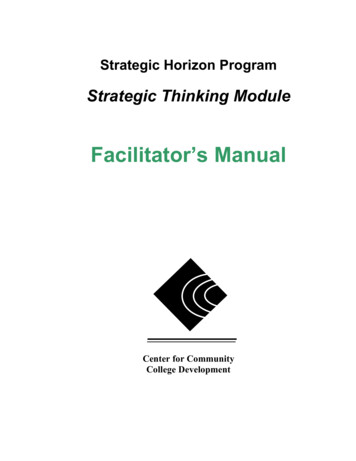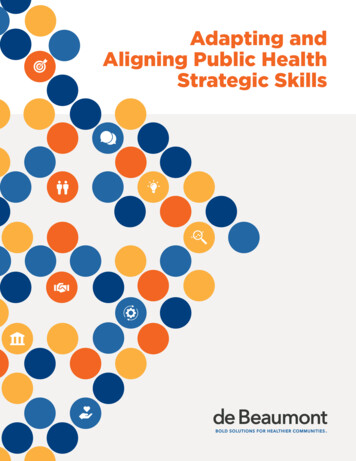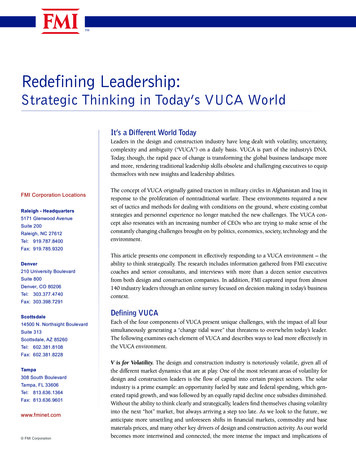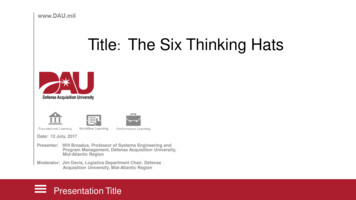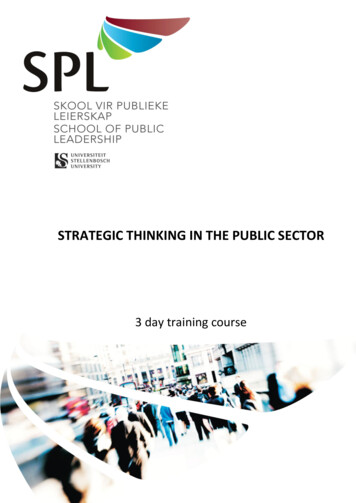
Transcription
STRATEGIC THINKING IN THE PUBLIC SECTOR3 day training course
Accreditation:This 6-credit HEQF (2007) level 8 short course covers knowledge of a formal postgraduateprogramme, approved and quality controlled as required by the South African QualificationAuthority (SAQA) and the Higher Education Qualification Committee (HEQC).Background:As a leader and manager in the public sector, how do you cope with challenges confronting you?How do you respond to the uncertainties in this regulatory environment? What is the bestresponse to political expectations, transformation, deregulation and delivery? Are you able tocreate sustainable public value?Strategic planning is the deliberate creation of fundamental decisions and actions that shape andguide every organisation, describing what it does and should be doing and why. It facilitatescommunication and participation, accommodates divergent interests and values, fosters wise andrational decision-making and promotes successful implementation and accountability.This course will teach you to think strategically, plan strategically and ultimately managestrategically in the context of the public and development sectors.Target participants:This course is primarily aimed at strategic decision makers in the public sector. Strategic decisionsare made at all levels in government including political and management levels. Public servicedecision makers in al spheres of government and in departments, entities, municipalities andeven non-governmental organisations who have to make significant and counting decisions willbenefit from the course. The course is particularly well suited for the needs of departmentaldecision teams from a department as the learning can then directly be applied to improve thestrategic capacity of the department and the impact of the team in this regard.Course objective, topics and outcomes:The overarching course objective is to provide participants with a conceptual understanding ofthe strategic thinking and management disciplines in the public sector context.The following outcomes will be achieved: increased understanding of strategic contexts and challenges,improved strategic capacity to deal with strategic challenges,enhanced competencies to understand strategy and to act strategically, andeffective and ethical strategic leadership.2
The following learning objectives are set: to transfer conceptual and theoretical understanding of strategic thinking andmanagement to participants,to contextualise the conceptual understanding within the public governance context,to build first level competencies in the techniques used in strategic processes in thepublic sector,to transfer an introductory strategic skills set to participants,to practice strategic capacity through the application of some strategic techniques,andto reinforce all learning with experiential learning applications in the class roomsetting.The contents of this course include the following topics: Understanding strategic management in the public sector;Learning to think strategically about work processes and decisions;Planning skills for strategic thinkers;Integrating the skills: strategic thinking, planning and managementAbility to apply various tools and techniques related to strategic thinking, planning andmanagement.Assessment and creditsAfter attending this course, participants should be able to fulfil the following assessment criteriathrough the indicated methods of assessment: Demonstrate an understanding of strategic concepts; Show capacity to analyse the strategic context; Illustrate strategic thinking and action capacity; and Integrate theory and practice for strategic action.Assessment criteria:Each participant must, through the assessments, provide proof that he / she is able to integratethe theory and practice of strategic thinking and action in a professional way.The class based assessment will contribute 40% of the final mark. The individual assignment willcontribute 60% of the final mark.Individual assignments have to be submitted on or before the due date as agreed upon based onthe class consensus. No late assignments will be accepted under any conditions.Assessment methods:3
Participants will be individually assessed by means of the following methods:1. An individual assignment,2. Class exercises;3. Case studies ;4. A formally assessed class based group project.Daily Programme of activities:Times08:00 - 08:3008:30 - 10:3010:30 – 11:00Day 1Registration, tea,coffeeIntroductionSetting the SceneIce BreakerBreak11:10 - 13:00Strategic Thinking:The Context13:00 – 13:4513:45 - 15:45LunchStrategic Thinking:The Concepts15:45 - 16:15Strategic thinking:The ConceptsDay 2Tea, coffeeDay 3Tea, coffeeStrategic Thinking:The ChallengesStrategic Thinking andManagement: Techniques:continuedBreakBreakStrategic Thinking:The lementationLunchStrategic Thinkingand Management:TechniquesClass Based Group Workand EvaluationStrategic Thinkingand Management:Techniques:continuedStrategic Thinking andManagement:The ConclusionsLunchStrategic Thinking andManagement: Bringing itAll Together Exercise4
Course leaderProfessor Erwin Schwella PhDErwin Schwella holds a PhD degree in Public Administration which he obtained from StellenboschUniversity in 1998. After having served as the Director of the School of Public Management andPlanning of the University of Stellenbosch since 1992 he currently holds a full professorship inPublic Leadership in the School. During his career, spanning over 26 years, he has held positionsin national and local government. For the largest part of his career he has been an academic.Erwin Schwella has been and still is a consultant and advisor to ministers and other executiveoffice holders at all spheres of government in the democratic South Africa. He has travelledextensively and was a visiting academic at many prominent European and United StatesUniversities.He is a leadership and governance trainer who has trained senior members of the South Africanliberation movements in preparation for their roles in government as well as political andgovernment leaders in the democratic South Africa and abroad.Erwin Schwella is author and co-author of more than 30 academic publications in the fields ofgovernance, leadership, organization development and public management. He serves and hasserved on the editorial boards of a number of national and international academic journals. He isa National Research Foundation rated researcher in South Africa.Currently he is a member of the Board of Overseers of the Centre for Public Leadership in TheHague, the Netherlands as well as a Board member of the Centre for Executive Leadership andGovernance at Rutgers University, New Jersey in the United States of America. His currentresearch interests are pursued in the area of public leadership and institution building for goodgovernance in a rule of law constitutional context. He is listed in Who’s Who in the World.5
Strategic Thinking: The Challenges Strategic Thinking and Management: Techniques: continued 10:30 - 11:00 Break Break Break 11:10 - 13:00 Strategic Thinking: The Context Strategic Thinking: The Challenges: continued Strategic Management: Towards Implementation Class Based Group Work and Evaluation 13:00 - 13:45 Lunch Lunch Lunch


